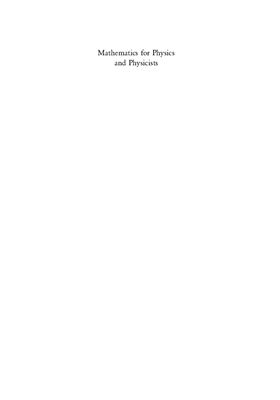Princeton University Press, 2007. - 672 pages.
What can a physicist gain by studing mathematics? By gathering together everything a physicist needs to know about mathematics in one comprehensive and accessible guide, this is the question Mathematics for Physics and Physicists successfully takes on.
The author, Walter Appel, is a renowned mathematics educator hailing from one of the best schools of France's prestigious Grandes Scoles. Time of his country's leadingscientists and engineers. In this unique book, oriented specifically toward physicists, Appel shows graduate students and researchers the vital benefits of integrating mathematics into their study and experience of the physical world. His approach is mathematically rigorous yet refreshingly straightforward, teaching all the math a physicist needs to know above the undergraduate level. Appel details numerous topics from the frontiers of mode physics and mathematics--such as convergence, Green functions, complex analysis, Fourier series and Fourier transform, tensors, and probability theory - consistently partnering clear explanations with cogent examples. For every mathematical concept presented, the relevant physical application is discussed, and exercises are provided to help readers quickly familiarize themselves with a wide array of mathematical tools.
Mathematics for Physics and Physicists is the resource today's physicists must have to strengthen their math skills and to gain otherwise unattainable insights into their fields of study
What can a physicist gain by studing mathematics? By gathering together everything a physicist needs to know about mathematics in one comprehensive and accessible guide, this is the question Mathematics for Physics and Physicists successfully takes on.
The author, Walter Appel, is a renowned mathematics educator hailing from one of the best schools of France's prestigious Grandes Scoles. Time of his country's leadingscientists and engineers. In this unique book, oriented specifically toward physicists, Appel shows graduate students and researchers the vital benefits of integrating mathematics into their study and experience of the physical world. His approach is mathematically rigorous yet refreshingly straightforward, teaching all the math a physicist needs to know above the undergraduate level. Appel details numerous topics from the frontiers of mode physics and mathematics--such as convergence, Green functions, complex analysis, Fourier series and Fourier transform, tensors, and probability theory - consistently partnering clear explanations with cogent examples. For every mathematical concept presented, the relevant physical application is discussed, and exercises are provided to help readers quickly familiarize themselves with a wide array of mathematical tools.
Mathematics for Physics and Physicists is the resource today's physicists must have to strengthen their math skills and to gain otherwise unattainable insights into their fields of study

